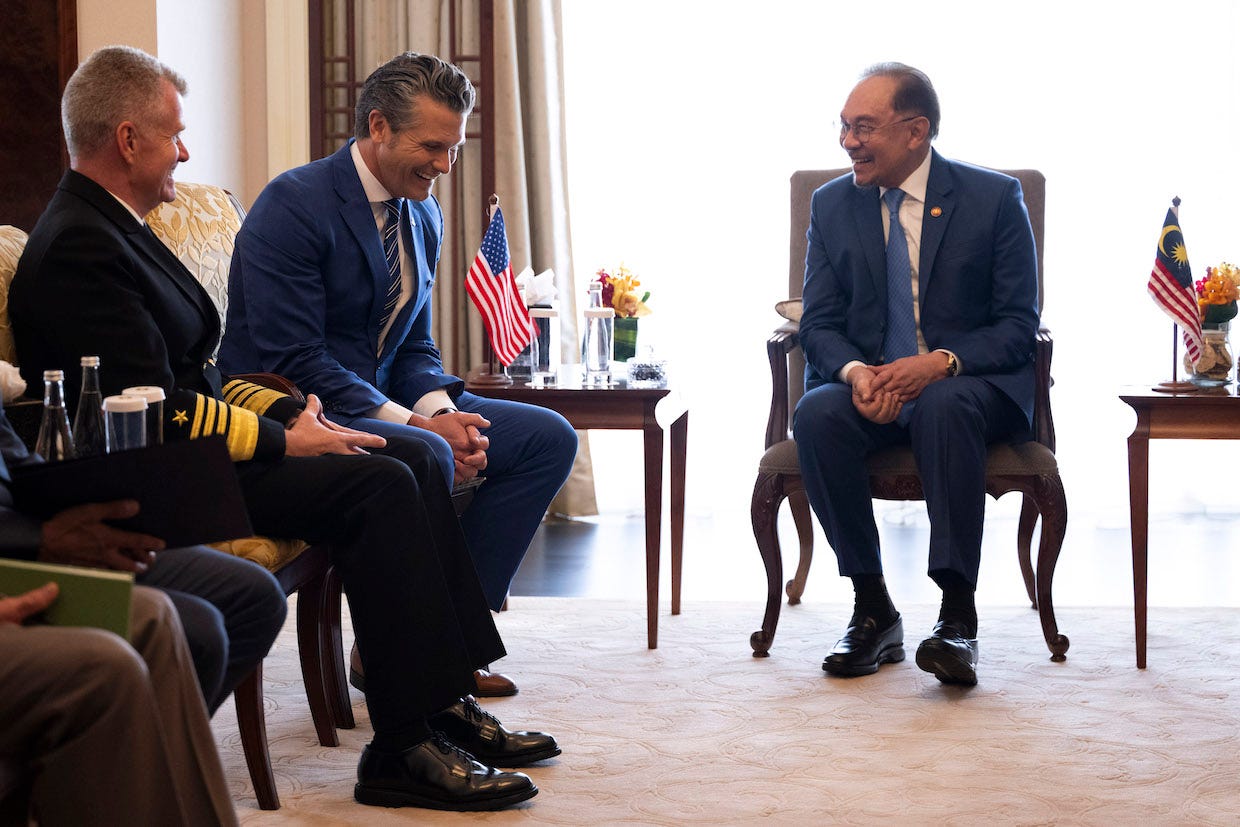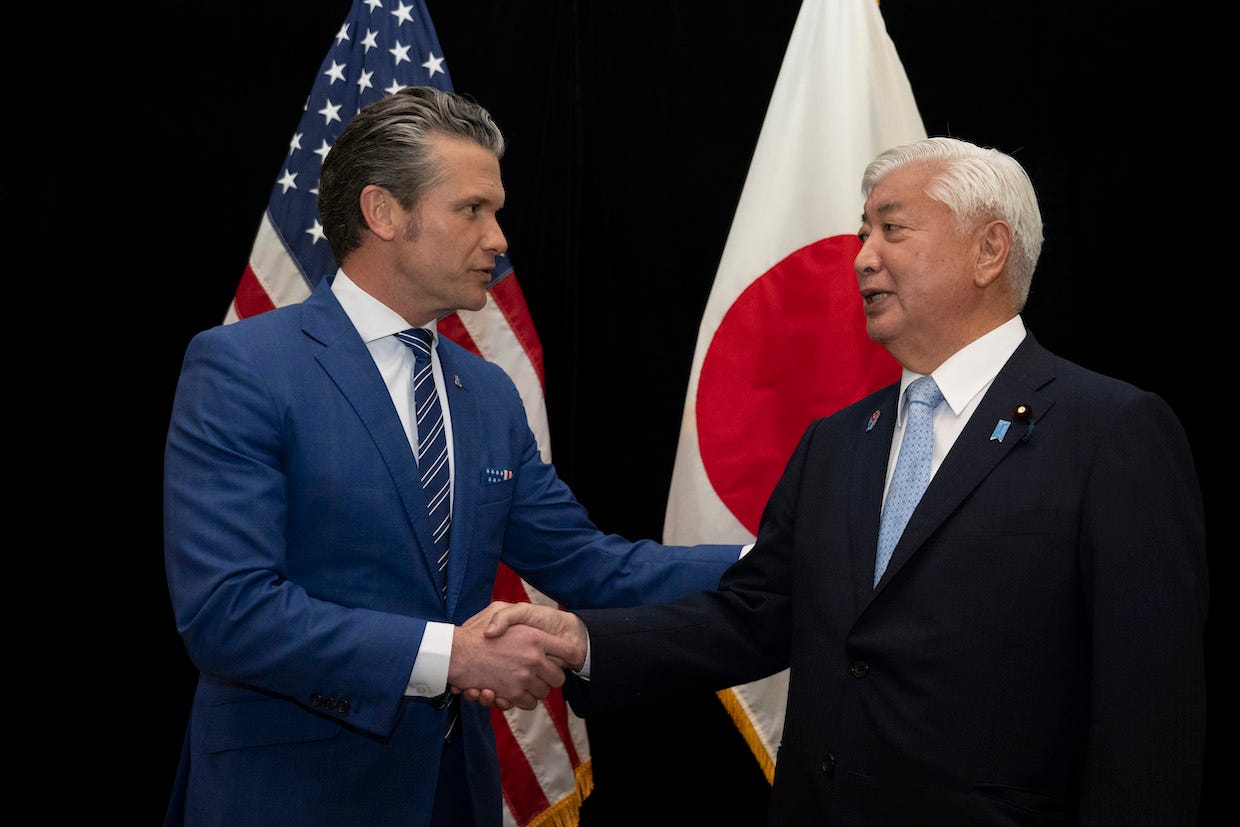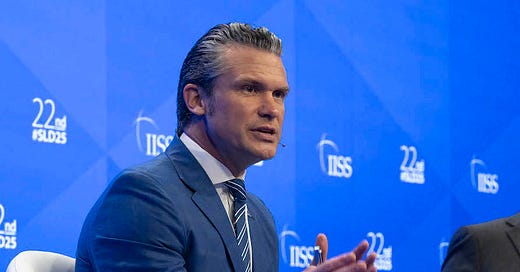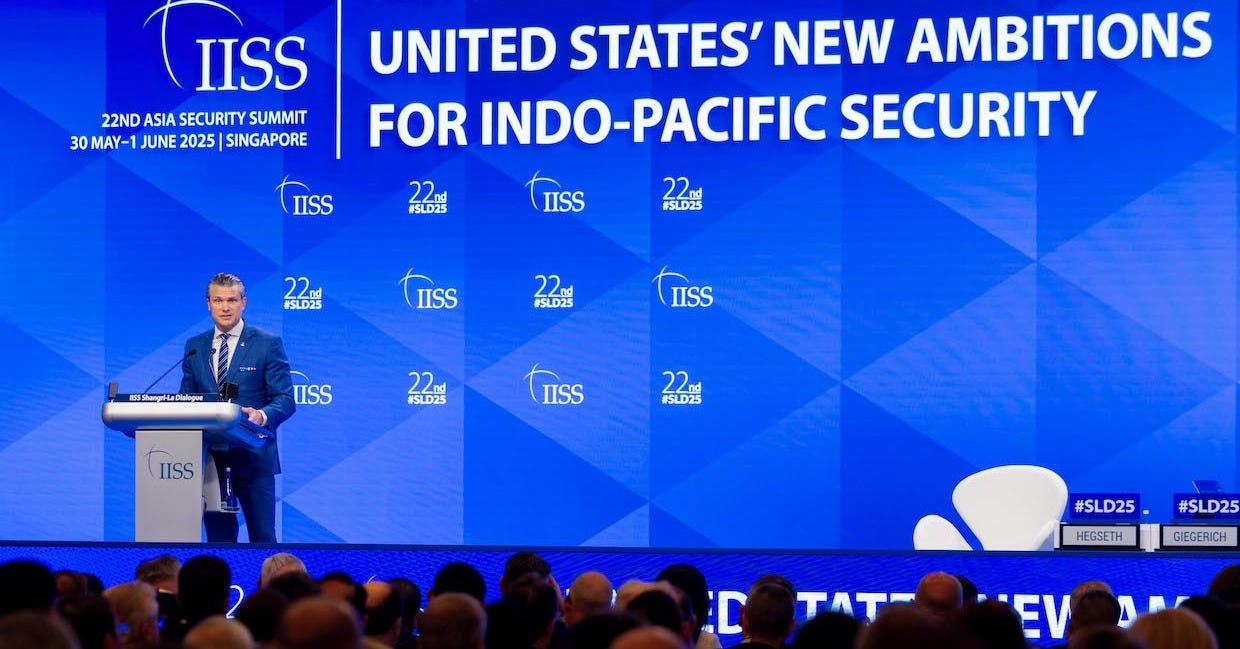In major speech, Hegseth warns Asian allies about 'entanglement' with China
The US defense secretary's comment about "economic dependence" on China reflects a Trump administration push to unwind trade ties to Beijing.
In a major speech in Singapore, Pete Hegseth warned of China’s intentions but assured partners of US support.
Hegseth also cautioned countries in the region against trying to maintain economic ties to China and security ties with the US.
The comments reflect a Trump push to unwind ties to China that is unlikely to happen without major economic pain.
SINGAPORE — In a major speech to defense officials from across the Asia-Pacific on May 31, US Defense Secretary Pete Hegseth struck an assertive tone, with sharp criticism of China, but offered assurances that the US remains committed to helping partners defend themselves amid rising tensions in the region.
Hegseth also made clear that the Trump administration wants partners to take more responsibility for that defense, especially by spending more on their militaries. Many in the region have supported that call, but another of Hegseth’s comments, which cast economic reliance on Beijing as challenge for security ties to the US, is likely to deepen concerns that the US wants countries to pick a side in the superpower rivalry.
Speaking at the International Institute of Strategic Studies’ Shangri-La Dialogue on his second trip to the region, Hegseth said he wanted to share the US Defense Department’s vision for the region but made clear that President Donald Trump sets policy. “My job is to create and maintain decision space for President Trump, not to purport to make decisions on his behalf,” Hegseth said, adding that Trump “was elected to apply ‘America First’ on the world stage.”
In his speech, Hegseth paired assurances to allies and partners with expectations that they contribute more to their relationships with the US. “An alliance cannot be ironclad if, in reality or perception, it is seen as one-sided,” Hegseth said, adding later that Trump is “rebalancing security and defense arrangements with key allies in the region.”
Hegseth said the US would “remain loyal to allies and partners.” Noting that some US military relationships in the region were decades or centuries old, Hegseth said “the only way to ensure lasting alliances and partnerships is to make sure that each side does its part and sees the benefit.”
Hegseth also detailed the Pentagon’s view of the challenge from China, saying that its military has been “rehearsing” for an invasion of Taiwan and that the “threat China poses is real, and it could be imminent.” That was followed by a line likely to concern countries that are trying to maintain ties to both superpowers.
“Facing these threats, we know that many countries are tempted by the idea of seeking both economic cooperation with China and defense cooperation with the United States,” Hegseth said. “Now, that is a geographic necessity for many. However, beware the leverage that the Chinese Communist Party seeks with that entanglement. Economic dependence on China only deepens their malign influence and complicates our defense decision space during times of tension.”
Pushing decoupling

Elsewhere in his remarks Hegseth said the US was “not here to pressure other countries to embrace or adopt policies or ideologies” and “not here to impose our will on you.” During a question-and-answer session, he said Washington was “opening our arms to countries across the spectrum: traditional allies, non-traditional allies, some of which can be overt, others of which are more covert.”
Despite those comments, Hegseth’s warning about “economic dependence on China” will ring in the ears of countries across Asia that rely on China to sustain their economies while working with the US train and equip their militaries.
It will be a particular concern for the Association of Southeast Asian Nations. The US is the military partner of choice for many of its 10 members, who are drawn by the more complex training and valuable instruction offered by the US. Two members, the Philippines and Thailand, are US military allies, and several others, including Vietnam and Cambodia, have sought deeper defense relationships with the US in recent years. But China is ASEAN’s top trade partner, ahead of the US by many measures. Several members run large trade surpluses with the US and were at the top of Trump's “Liberation Day” tariff list on April 2 — Cambodia, Vietnam, Thailand, and Indonesia face some of the highest rates in the world. (The tariffs were suspended for 90 days on April 9.)
Trump administration officials have framed tariffs as a way to compel countries to limit their trade relations with China, and they were a topic of concern at the 46th ASEAN Summit a few days before the dialogue. A leaders’ statement said “unilateral and retaliatory trade actions are counterproductive and risk exacerbating global economic fragmentation.” Prime Minister Anwar Ibrahim of Malaysia, which holds ASEAN’s rotating chairmanship, echoed the statement in a speech at the dialogue. “We warn of the dangers of unilateral actions, retaliatory tariffs and the growing risk of global fragmentation,” Ibrahim said. “We affirm ASEAN’s commitment to an open, predictable and rules-based trading system, not because it is expedient, but because it is essential.”
Others in the region face similar pressure. Japan and South Korea are among the US’s closest military allies and each hosts tens of thousands of American troops. Both also have deep economic ties to China, which Beijing has used as leverage in disputes in the past. On April 2, Seoul was hit with a 25% tariff and Tokyo with 24%. Trump has long criticized what he sees as unfair trade relations with Japan in particular, buying a full-page newspaper ad in 1987 that said “Japan and other nations have been taking advantage” of the US for decades. Trump and administration officials have said Tokyo should pay more to host US forces and spend more on its military.
Hegseth’s remark about economic “entanglement” with China “does sound very much like it's directed at Japan,” though others in the region have similar economic-security dynamics with the US and China, said Robert Ward, the Japan chair at IISS.
“What Hegseth, I think, was doing was in a sense saying you've got to make a choice here. You can't have it both ways if you've got China as your economic friend and the US as your security friend,” Ward said in an interview at the dialogue. “So he was, in a sense, trying to sort of push a decoupling.”
Keep trading, keep the peace

Ward said it would hard to convince countries to unwind their economic ties to China while they face pain from Trump’s tariffs and as the US disengages from regional trade architecture, such as the Trans-Pacific Partnership that Trump exited just days after taking office in 2017. China has also cited Trump’s tariffs to cast itself as a better trade partner, though it has warned countries against making trade deals that harm its interests.
“The US's strategic economic involvement in the region is actually quite thin,” Ward said, adding that US “absence” gives China “an opportunity to pull countries closer into its orbit. So I can see why Hegseth was saying that, but I think actually forcing it is going to be a bit more difficult.”
Tokyo has signaled it won’t join an economic bloc against China, its largest trade partner, and officials at the dialogue said they would not willingly take sides.
Malaysia’s “active non-alignment” is meant “to preserve our ability to act on our terms,” Ibrahim said on May 31. “The suggestion that if we do not necessarily align fully with one side, then we must have capitulated to the other, is untenable.”
“For Singapore, we believe that taking sides regardless of issues and context breeds irrelevance,” Singapore Defense Minister Chan Chun Sing said on June 1. “If we have to choose sides, may we choose the side of principles — principles that uphold a global order, where we do not descend into the law of the jungle, where the mighty do what they wish and the weak suffer what they must.”
“Despite all the differences between our superpower friends, we are friends to all,” Thai Defense Minister Phumtham Wechayachai said on June 1. “I do believe that the relationship and interaction and the spirit of friendship will help easing and reducing tension.”
Asked specifically about anxiety caused by Trump’s tariffs, Hegseth demurred. “I am happily in the business of tanks, not trade, and I will leave that discussion to the man who knows how to do it best, which is President Trump.” But others warned that disrupting global trade could have security implications.
“De-risking supply chains is an unfortunate but necessary response to intensifying strategic competition. However, letting this tip over into wholesale decoupling would be a grave mistake,” Australian Defense Minister Richard Marles said on May 31. “Dividing the Indo-Pacific into geostrategic and geo-economic blocs would not only make us all poorer, it would make us more vulnerable to conflict. If opportunities are removed to become more prosperous through trade and investment between states, key incentives are also removed to keep the peace.”




